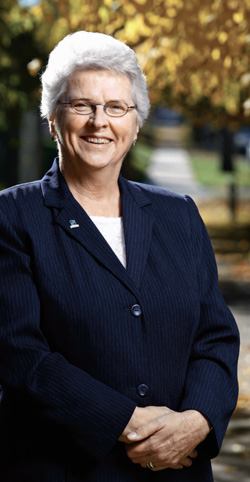Mercy’s managers are convinced that such efforts are essential to building stable individuals and families, yet they wrestle with the impact that program expenses have on the bottom line of their properties (see “Give and Get,” page 36). “Mercy provides so many residential services that their operating expenses can, at times, get out of whack,” observes Joseph Hagan, president of Chicago-based National Equity Fund, which has found investors for several of Mercy’s projects.
Still, when your portfolio includes “special needs” properties that serve the mentally ill, AIDS patients, struggling refugees, and single parents, it’s difficult to cut such ancillary services.
As a result, one tactic the company is implementing is paring down the number of states in which it develops, owns, and manages properties from 19 to nine, in order to achieve greater operating efficiencies and economies of scale. “We can’t be all things to all people,” Sister Lillian says.
That will allow the company to maintain services at communities such as Denver‘s Decatur Place, a transitional housing apartment property for single parents. “About 90 percent of our families are coming right out of crisis, often brought on by drugs, alcohol or domestic violence,” says Sister Kathleen Andrews, who has managed the Mercy-owned property since 1999.
Decatur Place’s many services include cooking courses, parenting classes, after-school computer training, and an anti-bullying program for children. The apartment project also is one of seven Mercy properties that offer their residents an eight-week “Making Dreams Happen” financial education course, funded by a $600,000 grant from the Citigroup Foundation.
FROM THE TOP DOWN
To keep operations in focus, the company has also sought to establish a more professional headquarters operation. That’s where new COO Banks is making a mark.
Banks has already hired high-level staff with impressive private-sector experience for Mercy’s team. New CFO Brian Shuman comes from one of the country’s largest REITs, AIMCO Properties. Frontier Airlines veteran Jeff Truax now directs IT operations. And REIT veteran Cheryll O’Bryan heads Mercy Services Corp., which manages the nonprofit’s portfolio of 220 properties; she previously managed a 28,000-unit portfolio for Equity Residential.
Ultimately, Banks believes that these steps will give Mercy an edge when approaching investors and lenders. The result could be access to a broader range of capital sources and faster execution of deals. In fact, as part of Mercy’s new five-year plan, Banks wants the nonprofit to be less reliant on fundraising. Currently, Mercy depends on monies from fundraising to defray about 28 percent of its operating costs. Banks wants to cap that percentage at 10 percent, so that more of the $12 million raised annually through giving can drive innovative programs such as new supportive services in senior projects.
Sister Lillian sees such Banks-led changes as essential to move the nonprofit forward: “We are committed to our affordable housing mission, but we need to be smarter about it.”
Along with a more focused corporate operation, though, Mercy would need to develop a stronger system of local accountability, Narasimhan suggested. For that reason, the organization’s five geographic business presidents—four of them hired since early 2006—have been given P&L and asset management authority for all properties in their region.
